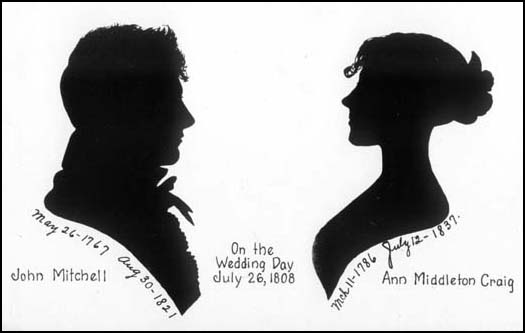Tag: ann middleton craig
-

1898 Letter from Robert Chambers Craig to John Thompson Mitchell with Recollections on Robert Craig
Thank you to Jim Mitchell for the photocopy of the below letter from Robert Chambers Craig to John Thompson Craig. The photocopy is of a typewritten copy of the original. Below is my transcription and following it some notes. Benham, March 26, 1898 Dear Cousin; — Your letter of March 18th is to hand, and…
-

James Bourne Mitchell and Family
Dorothy Mitchell McClure gave this to me when I was young. I didn’t make a note who had written it and am unsure who it was. Dorothy added that the below mentioned Missouri Valley College was her Alma Mater. * * * * * James Bourne Mitchell and family by a descendant of J. B.…
-

James Bourne Mitchell Autobiography
James B. Mitchell was born 27 June 1821, died March 12, 1901. He was the grandson of Robert Craig–son of John Mitchell and Ann Middleton Craig. He married Martha C. Dysart, born 5 March 1825–died February 19, 1912. They resided in Randolph Co. MO. This autobiography is had courtesy of Mitchell Noll. * * *…
-

ANNE MIDDLETON CRAIG MITCHELL TRAVEL JOURNAL, 1836
This is the transcript of the journal kept by Anne Middleton CRAIG MITCHELL of her travel from Abingdon, Washington, Virginia to Randolph County, Missouri in 1836. This was passed to family by John T. MITCHELL of Kansas City, MO, as given by Anne’s son, Rev. J. B. MITCHELL. Mitchell NOLL passed it along to me.…
-

Wedding Day Silhouettes of John Mitchell and Ann Middleton Craig
John MITCHELL b. 1767 Donegal, Ulster, Ireland, d. 1821 VA., married 1808 July 26 in , Washington, Virginia to Ann Middleton CRAIG b. 1786 VA . d. 1837 Randolph, MO. Obtained from Dorothy Mitchell McClure.